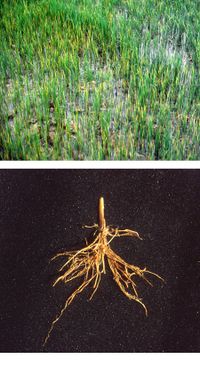Meloidogyne graminicola
| Literature database |
|---|
| 135 articles sorted by: |
| • year (descending) |
| • research topics |
| • countries/regions |
| • host plants |
| • list of antagonists |

Author(s): International Rice Research Institute
Source: Flickr
Meloidogyne graminicola Golden & Birchfield, 1965 - (rice root knot nematode)
The nematode attacks rice and some other crops in tropical and subtropical regions. Rainfed as well as irrigated paddy rice is infested, often resulting in crop losses of more than 50%. A single rice plant may have more than 1000 galls. Above-ground symptoms include discoloration and wilting. Characteristic hook-like, terminal galls develop on the rice roots within a few days after penetration of the juveniles.
The life cycle from egg to egg can be completed in as little as 3-4 weeks. Some weeds serve as alternate hosts and can sustain populations between seasons, e.g. the common rice weed Echinochloa colona. Management involves resistant cultivars and the use of nematicides (e.g. in seedbeds).
| Vernacular names | |
|---|---|
| • Deutsch: | Reiswuzelgallennematode |
| • English: | rice root knot nematode |
| • Français: | nématode galligène du riz |
J2 juveniles measure around 450 µm in total length and 11 µm in stylet length. The perineal pattern is oval, almost circular in shape without lateral incisures or gaps. The tail tip tapers to a long, fine point with a long hyaline region.
For a review see Mantelin et al., 2017.